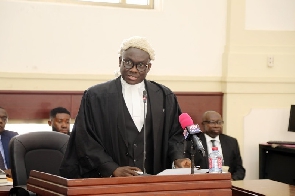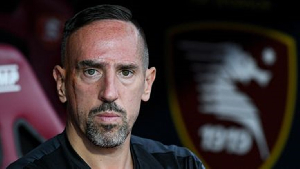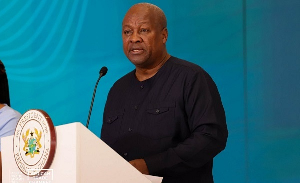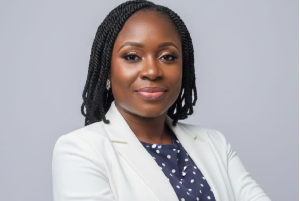The Attorney-General and Minister of Justice, Godfred Yeboah Dame has stated that it is the sole prerogative of a trial judge to decide whether to adopt previous proceedings or not.
According to him, “The true position of the law, is actually up to the trial judge to make that determination. The trial judge makes that determination based on factors that he considers necessary.”
Godfred Dame made these remarks while speaking to journalists after securing a favourable decision, early this month, at the Court of Appeal that overturned a High Court’s ruling directing that the trial of former COCOBOD boss and two others should start afresh.
He however pointed out that parties are also at liberty to challenge the decision of the judge when they are aggrieved.
The former COCOBOD Chief Executive, Dr. Stephen Opuni and businessman Seidu Agongo as well as Agricult Ghana Limited, are facing 27 charges, including willfully causing financial loss to the state and contravention of the Public Procurement Act in the purchase of Lithovit liquid fertiliser between 2014 and 2016.
They have all pleaded not guilty and are on bail.
The case was initially transferred to Justice Kwasi Anokye Gyimah following the retirement of former Supreme Court judge, Justice Clemence Honyenuga.
And in his first major activity, the judge declined the prosecution’s plea to adopt the proceedings of Justice Honyenuga, a Justice of the Supreme Court now retired.
“If I adopt the proceedings, I am basically adopting every act and decision that has been taken by the previous judge in the matter and I will be saddled with the same suspicions and allegations of unfairness that have been levelled against the current state of the proceedings,” he said in his ruling on April 4, 2023.
Justice Gyimah also referred to section 80(2) (a) of NRCD 323, which states that one of the factors a court is enjoined to look at when assessing the credibility of a witness is the witness’s demeanour.
“Much as that may be the right position, in a criminal trial where the liberty of the accused is at stake and where the accused is by law presumed innocent and also entitled to a fair trial, any factor, however minimal or insignificant its effect, that will enhance the opportunities for the fair trial of an accused person should not be overlooked by the court.”
Justice Kwasi Gyimah has since been transferred from Accra to Kumasi after sitting on the case for only four times, and the matter had since been handed over to Justice Aboagye Tandoh to continue.
According to Godfred Dame, the decision by the High Court judge to restart the case was retrogressive.
“It is actually a little bit backward, with all respect, for a trial which has advanced to this stage for an order to be made to start de novo (afresh). It amounts to giving the evidence twice,” he asserted.
His description of Justice Gyimah’s decision being backward has baffled some legal minds who pitched the Opuni trial with the criminal trial of Gregory Afoko where the Attorney General after terminating the first trial (Nolle Prosequi) that had neared completion, started all over again.
Meanwhile, the Attorney-General has maintained that it was wrong for people to think that it is only in civil cases that proceedings are adopted, noting that there are several cases in which criminal proceedings have been adopted.
“The true position of the law, is actually up to the trial judge to make that determination. The trial judge makes that determination based on factors that he considers necessary.
“Any if the parties are aggrieved by the exercise of that discretion, the party is entitled to launch an appeal, which we did and we felt that the matters that were relied upon by the trial judge were, with all respect to him, quite irrelevant. And therefore, the proper thing to do, which is actually the most progressive step in the circumstances calls for the evidence to be adopted and for us we won.”
A-G’s argument in 2021
The Attorney-General’s current position is in sharp contrast to what he told the Supreme Court in 2021, in which he succeeded in getting the court to review its earlier decision which went in favour of the accused when the court barred now retired Justice Honyenuga from continuing the trial.
“We respectfully submit that the order prohibiting the trial judge will work substantial miscarriage of justice in the trial of the accused person. The decision has the effect of placing the case in the hands of a judge who has not had the benefit of the entire trial, observing the demeanour and composure of the various witnesses called by the prosecution in order to assess their credibility.
“It is our contention that, regardless of the course to be adopted by a new judge to whom hearing of the matter is entrusted, the further conduct of the case will suffer,” the statement of claim filed by the Attorney-General Godfred Dame himself dated August 18, 2021 posited.
He further stated, “If the new judge orders an adoption of the evidence led so far rather than a commencement ‘de novo’, he would definitely have lost the benefits of the conduct of a full trial by him, – observation of the demeanour, countenance and composure of witnesses, etc.”
He therefore justified in that statement that it was “fundamentally wrong for this Court to prohibit the trial judge from further hearing of a case when all he did was to perform a duty placed on him by law”.
Supreme Court’s position in 2023
Writing a decision of the Supreme Court in the Republic vrs High Court (Criminal Division) exparte Stephen Kwabena Opuni on January 24, 2023, Justice Dotse stated:
“The Supreme Court did not mention its application to the criminal cases. There is also no specific legal provision on whether part heard trials must start de novo or be adopted by the new Judge. The practice for now is that, in criminal trials, the practice is to start trials de novo.
“Perhaps the time has come for this problem to be reviewed, This is because, if as a country we are to make some progress in the prosecution of criminal cases, especially corruption related cases pursuant to the Article 19 provisions of the Constitution 1992, then the bold step has to be taken to introduce sweeping reforms in this part of our criminal justice. We therefore appeal to the Chief Justice to urgently consider reforms in this part of our criminal justice.”
Legal Reforms
After securing the favourable judgement from the Court of Appeal on July 3, 2023 quashing the de novo trial, Mr Dame announced his decision to get Parliament to approve a new Bill for judges to adopt proceedings in criminal trials in the event that another judge is unable to conclude a matter before him or her.
You can also watch the latest episode of The Lowdown:
General News of Saturday, 15 July 2023
Source: starrfm.com.gh













